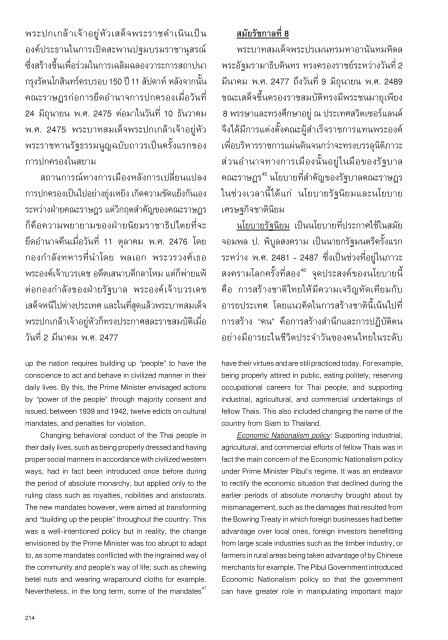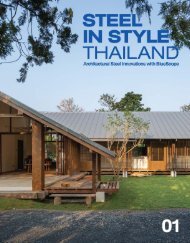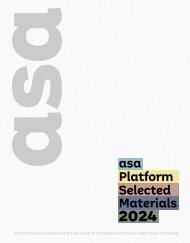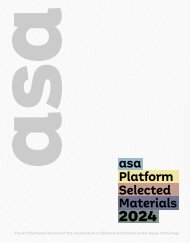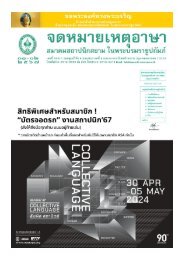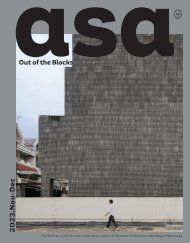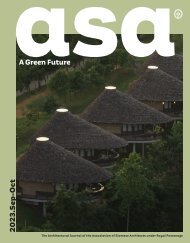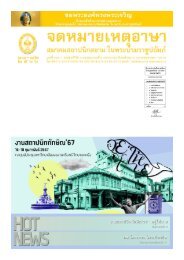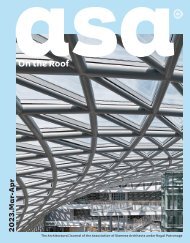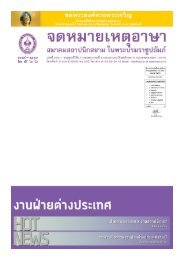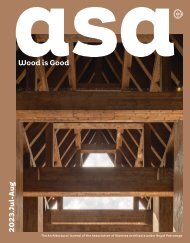บ้านเรือนถิ่นไทยในช่วงเจ็ดทศวรรษ 2489-2559
Create successful ePaper yourself
Turn your PDF publications into a flip-book with our unique Google optimized e-Paper software.
พระปกเกล้าเจ้าอยู่หัวเสด็จพระราชดำเนินเป็น<br />
องค์ประธานในการเปิดสะพานปฐมบรมราชานุสรณ์<br />
ซึ่งสร้างขึ้นเพื่อร่วมในการเฉลิมฉลองวาระการสถาปนา<br />
กรุงรัตนโกสินทร์ครบรอบ 150 ปี 11 สัปดาห์ หลังจากนั้น<br />
คณะราษฎรก่อการยึดอำนาจการปกครองเมื่อวันที่<br />
24 มิถุนายน พ.ศ. 2475 ต่อมาในวันที่ 10 ธันวาคม<br />
พ.ศ. 2475 พระบาทสมเด็จพระปกเกล้าเจ้าอยู่หัว<br />
พระราชทานรัฐธรรมนูญฉบับถาวรเป็นครั้งแรกของ<br />
การปกครองในสยาม<br />
สถานการณ์ทางการเมืองหลังการเปลี่ยนแปลง<br />
การปกครองเป็นไปอย่างยุ่งเหยิง เกิดความขัดแย้งกันเอง<br />
ระหว่างฝ่ายคณะราษฎร แต่วิกฤตสำคัญของคณะราษฎร<br />
ก็คือความพยายามของฝ่ายนิยมราชาธิปไตยที่จะ<br />
ยึดอำนาจคืนเมื่อวันที่ 11 ตุลาคม พ.ศ. 2476 โดย<br />
กองกำลังทหารที่นำโดย พลเอก พระวรวงศ์เธอ<br />
พระองค์เจ้าบวรเดช อดีตเสนาบดีกลาโหม แต่ก็พ่ายแพ้<br />
ต่อกองกำลังของฝ่ายรัฐบาล พระองค์เจ้าบวรเดช<br />
เสด็จหนีไปต่างประเทศ และในที่สุดแล้วพระบาทสมเด็จ<br />
พระปกเกล้าเจ้าอยู่หัวก็ทรงประกาศสละราชสมบัติเมื่อ<br />
วันที่ 2 มีนาคม พ.ศ. 2477<br />
up the nation requires building up “people” to have the<br />
conscience to act and behave in civilized manner in their<br />
daily lives. By this, the Prime Minister envisaged actions<br />
by “power of the people” through majority consent and<br />
issued, between 1939 and 1942, twelve edicts on cultural<br />
mandates, and penalties for violation.<br />
Changing behavioral conduct of the Thai people in<br />
their daily lives, such as being properly dressed and having<br />
proper social manners in accordance with civilized western<br />
ways, had in fact been introduced once before during<br />
the period of absolute monarchy, but applied only to the<br />
ruling class such as royalties, nobilities and aristocrats.<br />
The new mandates however, were aimed at transforming<br />
and “building up the people” throughout the country. This<br />
was a well-intentioned policy but in reality, the change<br />
envisioned by the Prime Minister was too abrupt to adapt<br />
to, as some mandates conflicted with the ingrained way of<br />
the community and people’s way of life; such as chewing<br />
betel nuts and wearing wraparound cloths for example.<br />
Nevertheless, in the long term, some of the mandates 47<br />
สมัยรัชกาลที่ 8<br />
พระบาทสมเด็จพระปรเมนทรมหาอานันทมหิดล<br />
พระอัฐมรามาธิบดินทร ทรงครองราชย์ระหว่างวันที่ 2<br />
มีนาคม พ.ศ. 2477 ถึงวันที่ 9 มิถุนายน พ.ศ. <strong>2489</strong><br />
ขณะเสด็จขึ ้นครองราชสมบัติทรงมีพระชนมายุเพียง<br />
8 พรรษาและทรงศึกษาอยู่ ณ ประเทศสวิตเซอร์แลนด์<br />
จึงได้มีการแต่งตั้งคณะผู้สำเร็จราชการแทนพระองค์<br />
เพื่อบริหารราชการแผ่นดินจนกว่าจะทรงบรรลุนิติภาวะ<br />
ส่วนอำนาจทางการเมืองนั้นอยู่ในมือของรัฐบาล<br />
คณะราษฎร 45 นโยบายที่สำคัญของรัฐบาลคณะราษฎร<br />
ในช่วงเวลานี้ได้แก่ นโยบายรัฐนิยมและนโยบาย<br />
เศรษฐกิจชาตินิยม<br />
นโยบายรัฐนิยม เป็นนโยบายที่ประกาศใช้ในสมัย<br />
จอมพล ป. พิบูลสงคราม เป็นนายกรัฐมนตรีครั้งแรก<br />
ระหว่าง พ.ศ. 2481 - 2487 ซึ่งเป็นช่วงที่อยู่ในภาวะ<br />
สงครามโลกครั้งที่สอง 46 จุดประสงค์ของนโยบายนี้<br />
คือ การสร้างชาติไทยให้มีความเจริญทัดเทียมกับ<br />
อารยประเทศ โดยแนวคิดในการสร้างชาตินี้เน้นไปที่<br />
การสร้าง “คน” คือการสร้างสำนึกและการปฏิบัติตน<br />
อย่างมีอารยะในชีวิตประจำวันของคนไทยในระดับ<br />
have their virtues and are still practiced today. For example,<br />
being properly attired in public, eating politely, reserving<br />
occupational careers for Thai people, and supporting<br />
industrial, agricultural, and commercial undertakings of<br />
fellow Thais. This also included changing the name of the<br />
country from Siam to Thailand.<br />
Economic Nationalism policy: Supporting industrial,<br />
agricultural, and commercial efforts of fellow Thais was in<br />
fact the main concern of the Economic Nationalism policy<br />
under Prime Minister Pibul’s regime. It was an endeavor<br />
to rectify the economic situation that declined during the<br />
earlier periods of absolute monarchy brought about by<br />
mismanagement, such as the damages that resulted from<br />
the Bowring Treaty in which foreign businesses had better<br />
advantage over local ones, foreign investors benefitting<br />
from large scale industries such as the timber industry, or<br />
farmers in rural areas being taken advantage of by Chinese<br />
merchants for example. The Pibul Government introduced<br />
Economic Nationalism policy so that the government<br />
can have greater role in manipulating important major<br />
214


